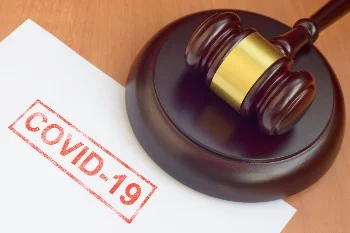
The novel coronavirus (COVID-19) is continuing to impact life in America in unprecedented ways. But, while the President and the states’ governors are constantly on the screens in people’s living rooms, and while legislators are busy working from home trying to figure out ways to protect health care workers and stimulate the economy, it seems that, in many respects, the judiciary has largely been forgotten.
While “essential” businesses are continuing to operate amidst stay-at-home orders, the state and federal courts in Oregon, Washington, and other states around the country are being forced to limit their operations, delay proceedings, and in many cases, effectively shut down. To be clear, some of these businesses are absolutely essential and need to remain open for the health and safety of the public at large. But, when businesses that are not truly essential are able to continue to operate, and when the government provides stimulus funds to these non-essential businesses while the courts are forced to deal with the cards they have been dealt, something is fundamentally wrong.
Courts across the Country Are Slowing Down and Shutting Down Because They Do Not Have the Capabilities They Need to Operate during the Pandemic
How serious is the issue? On March 27, Oregon Chief Justice Martha L. Walters postponed most trials and hearings until after June 1. Not only does this have a prejudicial effect on the parties to civil lawsuits and criminal proceedings that are currently pending, but it all but guarantees an insurmountable backlog once the courts reopen at full capacity. Moreover, as certain types of cases and hearings are to be expedited, many parties – plaintiffs and defendants – will have to wait well past June 1.
Of course, all of this assumes that the Oregon courts’ restart date will not get pushed back further. The likelihood of this happening currently appears to be fairly high, as the peak date for the novel coronavirus (COVID-19) outbreak in Oregon is not expected to come until late April or May.
In Washington, it is a similar story, although there the projections suggest that the outbreak has already peaked. In Washington, all jury trials have been suspended until after July 6. This does not mean that all jury trials will resume on April 25. The courts simply cannot handle that type of volume. So, just as in Oregon, the process of resuming court proceedings will be slow and drawn out, and will lead to even further backlogs in the state’s already overburdened legal system.
Even at the federal level, trial courts are finding that they are not sufficiently equipped to remain fully operational during the pandemic. The U.S. Court’s website has been posting routine updates with information about postponements and continuances of cases filed in federal district courts across the country. Hearings are being postponed. Jury trials are being postponed. Our judicial system is grinding to a halt while simultaneously backing itself into a corner, and very few people outside of the judicial system and the legal community seem to care.
The Courts Are Utilizing Their Available Phone and Videoconferencing Resources, But It’s Not Enough
Fortunately, the courts are not shutting down entirely. They are making valiant efforts with the resources they have to serve as many parties as they can. State and federal courts in Oregon, Washington, and other jurisdictions are utilizing phone and videoconferencing resources in unprecedented ways. Combined with maintaining social distancing during the limited in-person court proceedings that are still taking place, this is preventing a complete shutdown of the judicial system.
However, even this silver lining needs to be viewed in context. As mentioned above, the suspension of most hearings and trials is going to create an extraordinary backlog, and the courts could be doing more if they had the resources to do so – but they do not. Bringing the courts into the 21st century has never been a priority, and we are going to begin feeling the effects of this now more than we have at any other time in the past 20 years.
What Can Be Done to Protect the Court System and Preserve Litigants’ Access to Justice?
So, those are the problems. What are the solutions? What can we do to ensure that the courts remain open and are able to continue to serve their fundamental role in our society?
Unfortunately, some of the damage has already been done. Even a week’s worth of trial postponements is enough to cause long-term disruptions. But, going forward, some of the ways that we can protect our court system and preserve litigants’ access to justice include:
- Legislating to Keep the Courts Open – Amidst all of the uncertainty, one thing that can, and should be, certain is that the courts will remain open. The enactment of legislation at the state and federal levels ensuring continued operation of the courts is a crucial step toward preserving access to justice during and after the novel coronavirus pandemic.
- Guaranteeing Funding to the Courts – The courts also need guaranteed funding. This does not mean any sort of “bailout” (the courts do not need it), but it does mean that the funds set aside for the courts must remain set aside. Guaranteeing funding is important in order to give court administrators the security that they can continue to operate as usual.
- Equipping All Courts with Videoconferencing Capabilities – Finally, all courts need to be equipped with videoconferencing capabilities – not just those in major cities. While this is one area where additional funding may be required, this funding can come from plaintiffs’ lawyers who donate their resources for the benefit of everyone.
Contact D’Amore Law Group
D’Amore Law Group is a plaintiffs’ law firm that represents clients in personal injury, medical malpractice, nursing home abuse, wrongful death, and other matters. If you have questions about your legal rights during the novel coronavirus (COVID-19) pandemic, we encourage you to call us directly or contact us online for a free consultation.
